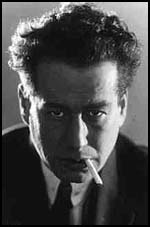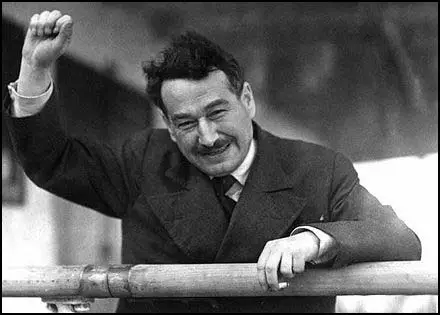Egon Erwin Kisch

Egon Erwin Kisch, the son of a wealthy Jewish businessman, was born in Prague on 29th April 1885. After finishing his education, he became a journalist with Bohemia, a German-language newspaper in the city. Deeply influenced by the work of Charles Dickens, at first he concentrating on reporting the lives of the poor. Viera Glosíková has argued: "He focused on the low classes, on everyday life, on criminal affairs. His articles came out in the paper’s Saturday supplement, and they were so successful and so distinct that he later published them in a book”. He also investigated the case of Alfred Redl who was discovered spying for the Russians in 1913.
On the outbreak of the First World War he served in the Austro-Hungarian Army. In 1915 he was a dispatch-runner on the Eastern Front. In 1916 he was briefly imprisoned for writing articles that were critical of the way the military was running the war. On his release he served in the army's press quarters with Robert Musil, who used his wartime experiences to publish The Man Without Qualities (1930).
After the war he joined the Austrian Communist Party and took part in the failed revolution in Vienna. Kisch moved to Berlin where he reported on the growing political tensions in the city. A book of his articles, The Raging Reporter, was published in 1924. During this period he was a close associate of Willi Münzenberg, a leading figure in the Comintern. Kisch also joined forces with Ludwig Renn and Anna Seghers to establish the Association of Proletarian-Revolutionary Authors. At the time he was described as "dark, short, and fat around the midriff... a vivacious little man, fluent of speech, sparkling of eye, restless in spirit, quick of thought and action".
Kisch was a leading opponent of Adolf Hitler and he criticised attempts to portray him as a brave soldier. In 1931 Hans Mend, a man who had served with Hitler in the war, published Adolf Hitler im Felde 1914-1918. Mend wrote: "In this book, I want to give the German people true and unvarnished information about Adolf Hitler as a front-line soldier. As a comrade I had many opportunities to hear his pronouncements on the war, witness his bravery, and became acquainted with his brilliant traits of character... I aim to prove that he was just the same in the field as he is today; courageous, fearless, outstanding.... Everyone who knew him in the field had to admit that he was a model front-line soldier... who... as a combat orderly in static warfare performed super-human feats in a dangerous and responsible position." The Nazi Party newspaper, Völkischer Beobachter, described Mend's book as "the finest Christmas gift for any supporter of Hitler. However, Kisch dismissed the book as the "military supplement" to Hitler's own book, Mein Kampf.
In 1933 Egon Erwin Kisch carried out an investigation into his army career in the First World War: "He (Hitler) was a lance corporal for four years. Every old soldier knows that the rank of lance corporal is only brief and temporary, only a preliminary to more senior noncommissioned rank. Hundreds of thousands of men can be infantrymen and never make lance corporal, but a lance corporal who never makes sergeant in four years' front-line service must be a very suspect type. Either he shirks commanding a squad, or he is incompetent to do so."
On 27th February, 1933, the Reichstag caught fire. When they police arrived they found Marinus van der Lubbe on the premises. After being tortured by the Gestapo he confessed to starting the Reichstag Fire. However he denied that he was part of a Communist conspiracy. Hermann Goering refused to believe him and he ordered the arrest of several leaders of the German Communist Party (KPD). Egon Erwin Kisch was one of those arrested. He was imprisoned in Spandau, but as a Czechoslovak citizen, he was expelled from Germany.
Kisch wanted to live in England but because of his communist beliefs he was refused entry. He suffered the same experience when he tried to attend an anti-fascist conference in Australia in 1934. He jumped from the ship in Melbourne, breaking his leg in the process. Carolyn Rasmussen has pointed out: "To the embarrassment of the Federal government, the High Court of Australia ruled on 19 December that Scottish Gaelic was not a European language within the meaning of the Immigration Act (1901-25). Kisch was free to exercise his wit and charm on large crowds. The government's inept attempts to keep him out of Australia had succeeded in making the name of a previously unknown journalist a household word.... His gallantry and good humour made the government's vendetta against him seem the more crass." On 17th February 1935, he addressed a crowd of 18,000 in Sydney about the dangers posed by Nazi Germany.

In 1937 Kisch traveled to Spain and reported on the Spanish Civil War. Kisch was a strong critic of the Munich Agreement in 1938. Although it was popular with most people in Britain because it appeared to have prevented a war with Nazi Germany, Kisch argued that the British government had behaved dishonorably and had lost the support of Czech Army, one of the best in Europe. In March, 1939, the German Army seized the rest of Czechoslovakia. Unable to return to the country of his birth, Kisch and his wife attempted to move to the United States. However, he was denied entry and after being kept on Ellis Island for six months he was allowed to move to Mexico in October 1940.
Kisch remained in Mexico City for the whole of the Second World War. During this period he published an autobiography, Sensation Fair: Tales of Prague (1941). In March 1946 he returned to Czechoslovakia where he worked as a journalist. In the 1946 general election the Communist Party won the largest number of parliamentary seats with 38 per cent of the votes and Klement Gottwald was able to set up a National Front government.
Egon Erwin Kisch died in Prague on 31st March 1948.
Primary Sources
(1) Carolyn Rasmussen, Egon Erwin Kisch (2000)
Acting on advice from London, the Lyons government declared Kisch a prohibited immigrant and refused him permission to land at Fremantle, Western Australia. The warmth and enthusiasm of supporters who visited him when his ship berthed in Melbourne, and the flurry of legal activity undertaken on his behalf, tempted the adventurer to jump on to the wharf on 13 November, breaking his leg. Rushed on board and taken to Sydney, he was able to disembark there because Justice H. V. Evatt, sitting alone, found the prohibition order to be illegal. The authorities gave Kisch a 'dictation test' in Scottish Gaelic; after he failed, he was convicted on the 28th of being a prohibited immigrant and sentenced to be deported.
To the embarrassment of the Federal government, the High Court of Australia ruled on 19 December that Scottish Gaelic was not a European language within the meaning of the Immigration Act (1901-25). Kisch was free to exercise his wit and charm on large crowds. The government's inept attempts to keep him out of Australia had succeeded in making the name of a previously unknown journalist a household word.... His gallantry and good humour made the government's vendetta against him seem the more crass.
While relatively few Australians had any sympathy for communists, the "Kisch Affair" created widespread fears that, by using the Immigration Act to curtail free speech, the government was resorting to tactics similar to those undermining democracy in Europe. The government made a second declaration, overcoming the technical shortcoming which Evatt had found in the first, and on 21 January 1935 Kisch was again convicted of being a prohibited immigrant. None the less, the government offered to remit his sentence of three months imprisonment and to pay costs if he left Australia promptly. He did so on 11 March after a final blaze of public appearances, including a torchlight procession in Melbourne to commemorate the Reichstag fire.
Student Activities
Adolf Hitler's Early Life (Answer Commentary)
Adolf Hitler and the First World War (Answer Commentary)
Adolf Hitler and the German Workers' Party (Answer Commentary)
Sturmabteilung (SA) (Answer Commentary)
Adolf Hitler and the Beer Hall Putsch (Answer Commentary)
Adolf Hitler the Orator (Answer Commentary)
An Assessment of the Nazi-Soviet Pact (Answer Commentary)
British Newspapers and Adolf Hitler (Answer Commentary)
Lord Rothermere, Daily Mail and Adolf Hitler (Answer Commentary)
Adolf Hitler v John Heartfield (Answer Commentary)
The Hitler Youth (Answer Commentary)
German League of Girls (Answer Commentary)
Night of the Long Knives (Answer Commentary)
The Political Development of Sophie Scholl (Answer Commentary)
The White Rose Anti-Nazi Group (Answer Commentary)
Kristallnacht (Answer Commentary)
Heinrich Himmler and the SS (Answer Commentary)
Trade Unions in Nazi Germany (Answer Commentary)
Hitler's Volkswagen (The People's Car) (Answer Commentary)
Women in Nazi Germany (Answer Commentary)
The Assassination of Reinhard Heydrich (Answer Commentary)
The Last Days of Adolf Hitler (Answer Commentary)
